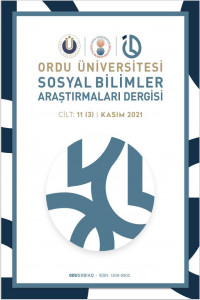Abstract
Geçmişten günümüze merak edilen ve araştırılan zekâ kavramı oldukça karmaşık ve çok boyutlu bir yapıya sahiptir. Zekâ özellikle 21. yüzyılda da üzerinde önemle durulan ve araştırmacıların ilgiliyle takip ettiği konuların başını çekmektedir. Bu çalışma temel olarak zekâ ile ilgili geçmişten günümüze tarihsel ve kavramsal olguları belirli bir hiyerarşi içerisinde sunmayı amaçlamaktadır. Bu temel amaç çerçevesinde makalede ilk olarak zekâ araştırmalarına ilişkin ilk çalışmalar hakkında bilgeler verilmiştir. Bununla birlikte alanda çalışan önemli araştırmacıların zekâya ilişkin ortak tanımlama girişimleri özetlenmiştir. Ardından belli başlı zekâ kurmalarına ilişkin bir sınıflandırma yapılmıştır ve yapılan sınıflandırmaya yönelik açıklamalar verilmiştir. Son olarak zekâyı açıklamaya yönelik geçmişten günümüze araştırmacılar tarafından ortaya konmuş kuramlardan birçoğu tarihsel hiyerarşi içerisinde sunulmuştur. Sonuç olarak zekâya yönelik yapılan birçok çalışmaya rağmen günümüzde halen ortak bir tanım ve kuramdan bahsetmenin mümkün olmadığı görülmektedir. Ortaya konulan her kuram ve çalışma zekâya yönelik bir önceki kuramın tamamlayıcısı olarak nitelendirilebilir. Nitekim zekâ doğrudan gözlenemeyen karmaşık bir olgudur.
Keywords
Zeka Zeka Kuramları Zeka Kuramlarının Sınıflandırılması Psikometrik Kuramlar Bilişsel Kuramlar Blişsel-Bağlamsal Kuramlar Biyolojik Kuramlar
References
- 1. Davidson, J., & Kemp, I. (2011). Contemporary models of intelligence. In R. Sternberg & S. B. Kaufman (Eds.), The Cambridge Handbook of Intelligence (pp. 58–84). Cambridge: Cambridge University Press.
- 2. Gardner, M. K. (2011a). Theories of intelligence. In M. A. Bray & T. J. Kehle (Eds.) The Oxford Handbook of School Psychology (pp. 79–100). Oxford: Oxford University Press.
- 3. Guilford, J. P. (1967). The nature of human intelligence. New York: McGraw-Hil.
- 4. Horn J.L. (1982) The theory of fluid and crystallized ıntelligence in relation to concepts of cognitive psychology and aging in adulthood. F.I.M. Craik, & S. Trehub (Eds.), Aging and Cognitive Processes içinde (s.237-278). Boston, MA: Springer.
- 5. McGrew, K. (2009). CHC theory and the human cognitive abilities project: Standing on the shoulders of the giants of psychometric intelligence research. Intelligence, 37(1), 1–10.
- 6. Müller, U., Ten Eycke, K., & Baker, L. (2015). Piaget’s theory of intelligence. In Handbook of intelligence (pp. 137-151). Springer, New York, NY.
- 7. Schneider, J., & McGrew, K. (2012). The Cattell-Horn-Carroll model of intelligence. In D. Flanagan & P. Harrison (Eds.), Contemporary Intellectual Assessment: Theories, Tests, and Issues (3rd ed., pp. 99–144). New York: Guilford Press.
Abstract
The concept of intelligence, which has been wondered and researched from past to present, has a very complex and multidimensional structure. Intelligence is at the forefront of the issues that are emphasized and followed by researchers in the 21st century.This study basically aims to present the historical and conceptual facts about intelligence from past to present in a certain hierarchy. In the framework of this main purpose, firstly, information about the first studies on intelligence research is given in the article. Also, the common identification attempts of important researchers working in the field regarding intelligence are summarized. Then, a classification was made on major intelligence theories. Finally, many of the theories put forward by researchers from the past to the present to explain intelligence are presented in the historical hierarchy. As a result, it is seen that despite many studies on intelligence, it is still not possible to talk about a common definition and theory even today. Each theory and study put forward appears as a complement to the previous theory for intelligence. As a matter of fact, intelligence is a complex phenomenon that cannot be observed directly.
Keywords
İntelligence Theories Of Intelligence Classification Of Intelligence Theories Psychometric Theories Cognitive Theories
References
- 1. Davidson, J., & Kemp, I. (2011). Contemporary models of intelligence. In R. Sternberg & S. B. Kaufman (Eds.), The Cambridge Handbook of Intelligence (pp. 58–84). Cambridge: Cambridge University Press.
- 2. Gardner, M. K. (2011a). Theories of intelligence. In M. A. Bray & T. J. Kehle (Eds.) The Oxford Handbook of School Psychology (pp. 79–100). Oxford: Oxford University Press.
- 3. Guilford, J. P. (1967). The nature of human intelligence. New York: McGraw-Hil.
- 4. Horn J.L. (1982) The theory of fluid and crystallized ıntelligence in relation to concepts of cognitive psychology and aging in adulthood. F.I.M. Craik, & S. Trehub (Eds.), Aging and Cognitive Processes içinde (s.237-278). Boston, MA: Springer.
- 5. McGrew, K. (2009). CHC theory and the human cognitive abilities project: Standing on the shoulders of the giants of psychometric intelligence research. Intelligence, 37(1), 1–10.
- 6. Müller, U., Ten Eycke, K., & Baker, L. (2015). Piaget’s theory of intelligence. In Handbook of intelligence (pp. 137-151). Springer, New York, NY.
- 7. Schneider, J., & McGrew, K. (2012). The Cattell-Horn-Carroll model of intelligence. In D. Flanagan & P. Harrison (Eds.), Contemporary Intellectual Assessment: Theories, Tests, and Issues (3rd ed., pp. 99–144). New York: Guilford Press.
Details
| Primary Language | Turkish |
|---|---|
| Subjects | Studies on Education |
| Journal Section | Articles |
| Authors | |
| Publication Date | November 25, 2021 |
| Submission Date | September 15, 2021 |
| Published in Issue | Year 2021 Volume: 11 Issue: 3 |

